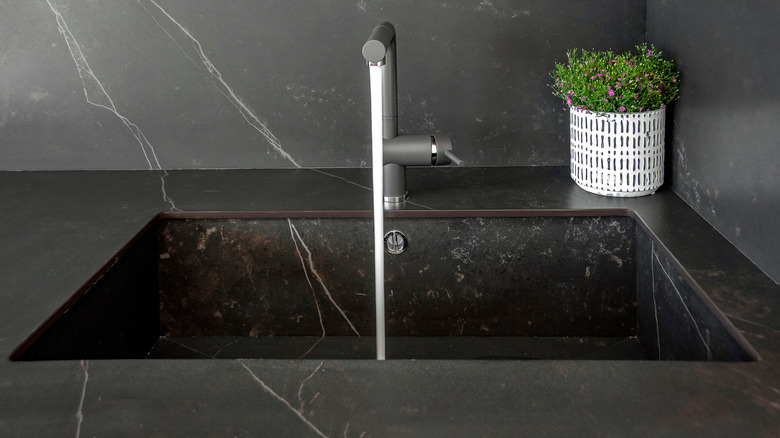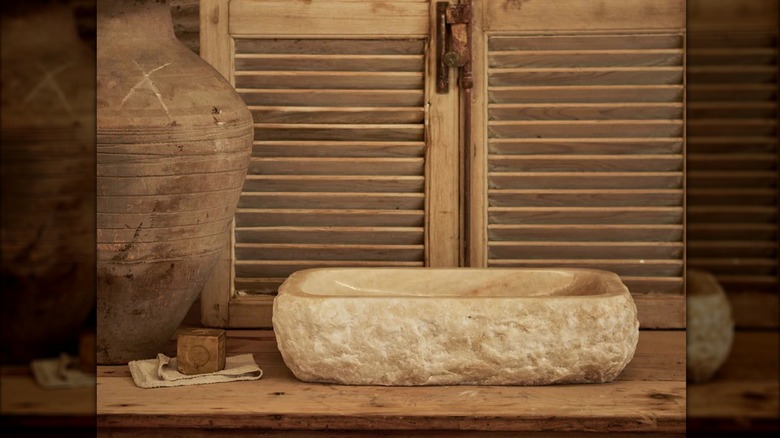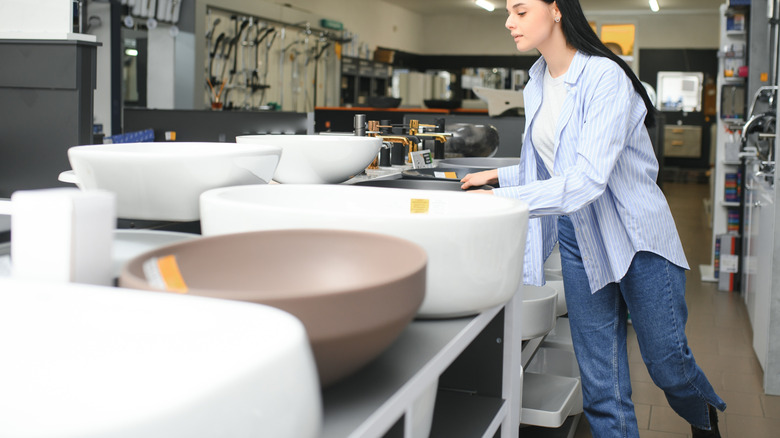Do Onyx Sinks Stand The Test Of Time And Are They Worth Your Investment?
While looking at sumptuous kitchen or master bathroom ideas that will make your space feel like a luxury oasis, you might come across a translucent natural stone material for your sink: onyx. With its striking design, rare occurrence, and varied color range, including red, pink, gold, green, blue, and black, the stone might captivate you with its beauty. But such features come at a high cost and you can expect to spend more than $250 per square foot for quality slabs. This is why before you commission it for your bathroom or kitchen sink, you must know if the fragile stone can stand the test of time and whether it's worth your investment.
To get concrete answers, House Digest spoke exclusively with Brandy Rinehart, an interior designer with Habitar Designs. "When it comes to luxury bathroom and kitchen design, onyx sinks offer an undeniable aesthetic appeal. Their striking translucency and unique veining make them a show-stopping feature in any space," she says. That being said, the stone is high-maintenance. Rinehart explains, "Regular sealing and careful cleaning are essential to prevent damage." Moreover, when "compared to materials like granite or quartz, onyx requires more attention to maintain its longevity."
Plus, it stains and scratches easily and is quite expensive. So, to decide whether it's the right material for your kitchen or bathroom sink, you must consider your usage frequency, the time and effort you're willing to put in for its maintenance, your aesthetic priorities, and your budget. "By carefully weighing these factors, homeowners can determine whether an onyx sink is the right choice for their space," says the designer.
Consider the durability and longevity of onyx sinks
If you expect to get what you pay for, you might be in for a surprise when it comes to onyx sinks. This is because, on the surface, you'll be investing in a stone that's breathtakingly beautiful. But you'd also be getting one that can't handle too much stress and sustains damage easily. "Onyx is a naturally occurring stone known for its captivating patterns and colors, but it is not as robust as other commonly used materials like granite or quartz," Brandy Rinehart sys in her exclusive interview with House Digest. "Unlike these denser stones, onyx is relatively soft and porous, making it more susceptible to scratches, stains, and damage from acidic substances." So, if you accidentally spill some store-bought cleaners or want to wash off dyes in your sink, you'll have to rinse them away instantly before the chemicals stain and mar its striking surface.
Rinehart continues, "Because of this, onyx sinks require more careful maintenance to retain their beauty over time." You'll have to use a gentle hand, soft sponge, and dish detergent to clean the sink and wipe it dry after usage to maintain it. In case you don't mind following a slew of care instructions, the designer mentions, "With proper care, an onyx sink can last several decades." Remember that the stone is porous by nature. "Regular sealing is necessary to prevent moisture absorption, and gentle cleaning products should be used to avoid etching the surface," Rinehart says. "Homeowners who invest in routine maintenance can enjoy their onyx sink for 20 years or more, but those who are less meticulous may find it deteriorates more quickly."
Is an onyx sink worth the investment?
With the colorful kitchen sink trend making a comeback, onyx sinks can seem like an ideal option. However, you should consider a few factors before you make a decision, advises Brandy Rinehart in her House Digest exclusive. "If aesthetics and exclusivity are top considerations, an onyx sink can be an incredible statement piece that elevates the entire space," she explains. "The unique luminescence of onyx, especially when backlit, creates an ambiance that other materials simply cannot replicate." It's also a great idea for people who love unique décor pieces since "no two onyx sinks are identical, making each one a one-of-a-kind statement piece."
"However, if practicality and durability are primary concerns, an onyx sink may not be the best choice. Given its vulnerability to scratches and stains, it may not be ideal for high-traffic bathrooms or kitchens where durability is a must," says Rinehart. It's also an expensive choice and we're not just talking about the initial price of the material. The designer mentions, "Additionally, the cost of ongoing maintenance should be factored into the overall investment decision." So, when buying a new sink, she suggests comparing the pros and cons of the natural stone, and weighing up your priorities. "For those willing to invest time in upkeep and who prioritize aesthetics above all else, an onyx sink can be well worth the investment. On the other hand, for homeowners seeking a low-maintenance, long-lasting solution, alternative materials may be a better fit," recommends Rinehart.


